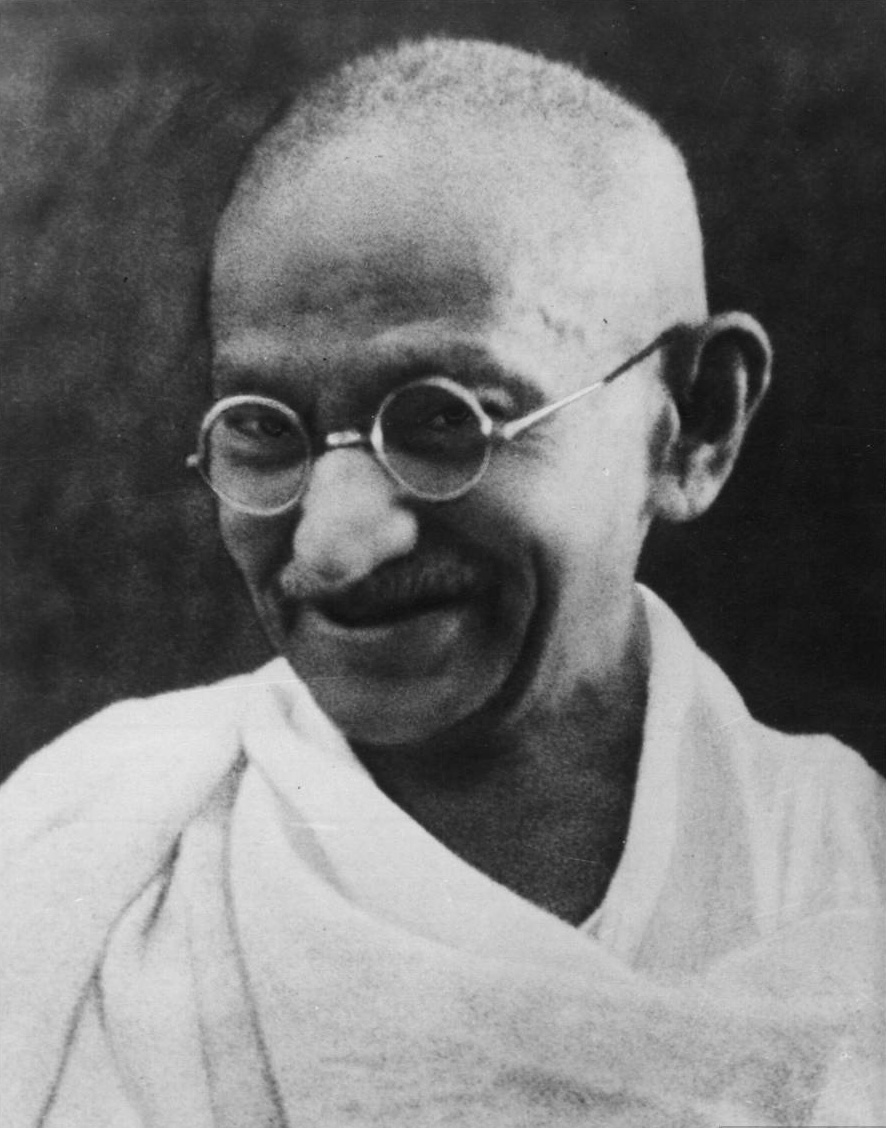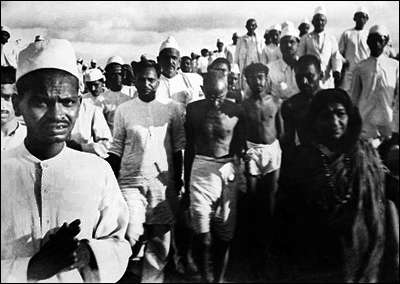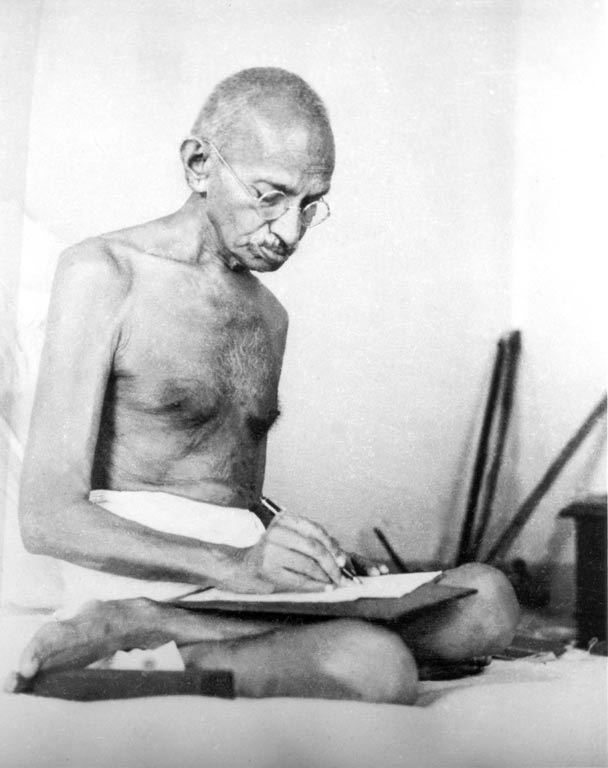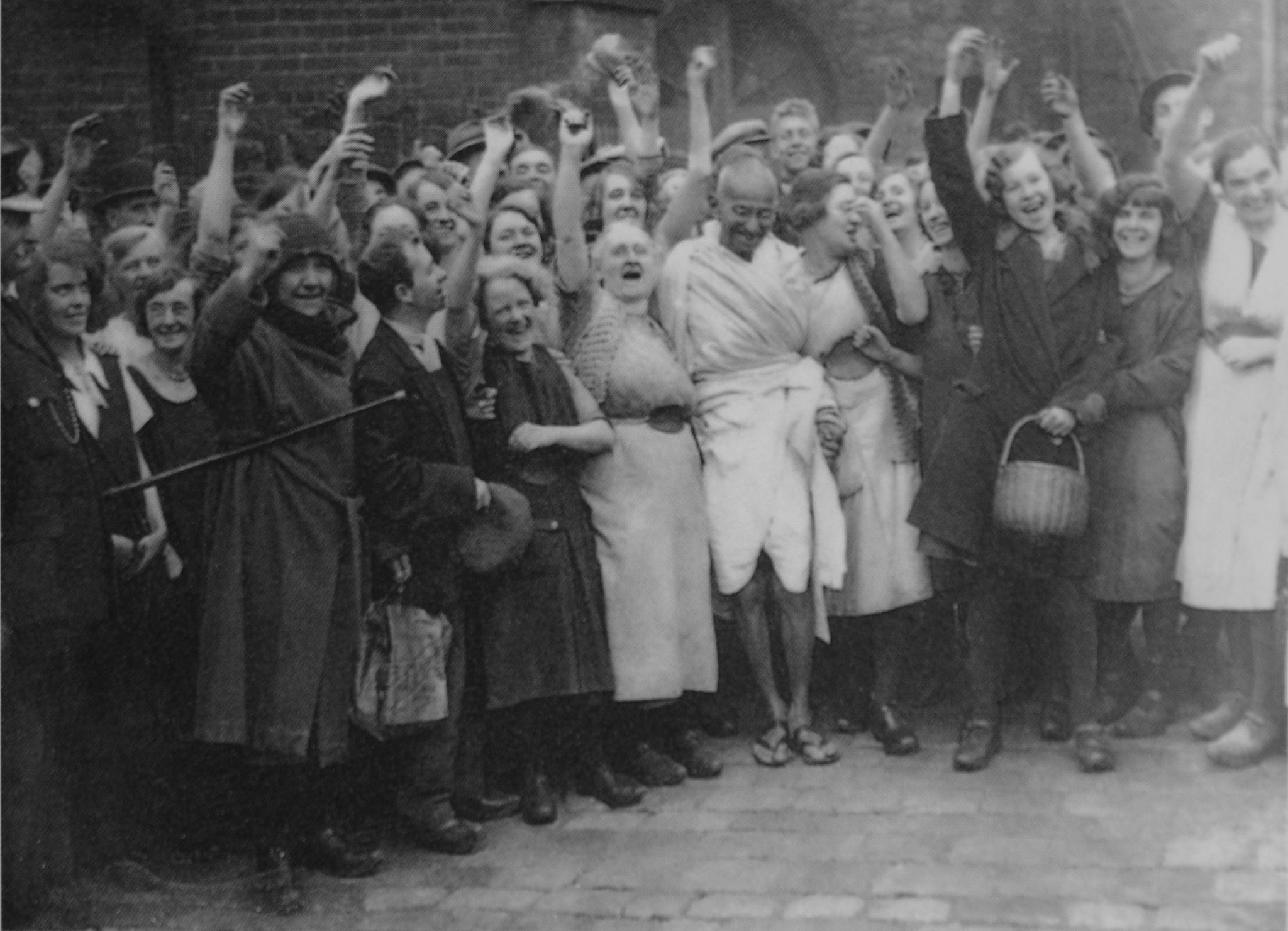Mahatma Gandhi - The Courage of Nonviolence
May 29, 2013 · 1 Comment
Courage is one of the key virtues of the VOV Pledge for Nonviolence. This is evident in the fourth paragraph which states:
Excerpt from "Mahatma Gandhi: The Courage of Nonviolence"
by Daisaku Ikeda
I was visiting Raj Ghat, where Mahatma Gandhi, the father of Indian independence, had been cremated.
Somewhere a bird sang. A forest was nearby, and squirrels ran through its lush green thickets. The area was a spacious, well-tended shrine to nonviolence.
As I offered flowers before the black stone platform that constitutes Gandhi's memorial, I bowed my head.

Image:Portrait of Gandhi.
Credit: http://images.google.com/hosted/life/f?&imgurl=eabb95f1554228a3 (Attribution via Wikimedia Commons)
I pondered Gandhi's brilliant spirit. I thought of his ceaseless struggles to douse the fires of hatred with water drawn from the pure springs of love for humanity. And I thought of how alone he was in his quest.
Violence solves nothing. By engaging in reprisals, you only hurt yourself.
"Gandhi tells us not to retaliate against the Muslims! How can he take their side? There's no way! They killed my family, including my five-year-old son!"
"Is he telling us just to endure the attacks of the Hindus? Ridiculous! Doesn't he know what we Muslims have been through all these years? After all, Gandhi's a Hindu himself, isn't he?"
The elderly sage went everywhere, wherever Hindus and Muslims were mired in blood-stained cycles of conflict and reprisal. He called for the killing to end. But people, crazed by hate, did not listen. They told him to leave, calling his attempts at reconciliation hypocritical or worse. They demanded to know whose side he was on.
But he wasn't on either side. And at the same time, he was on both sides. To him, people are brothers and sisters. How could he stand by, a silent witness to mutual slaughter? Gandhi declared that he was willing to be cut in two if that was what people wanted, but not for India to be cut in two. What good, he demanded to know, could ever come of hatred? If hate was returned with hate, it would only become more deeply rooted and widespread.
Just as fire is extinguished by water, hatred can only be defeated by love and compassion.
Suppose someone sets fire to your home and you retaliate by setting fire to theirs, soon the whole town will be in flames! Burning down the attacker's house won't bring yours back. Violence solves nothing. By engaging in reprisals, you only hurt yourself.
But no matter how urgently Gandhi called on people to listen to reason, the fires of hatred raged on. Against the lone Gandhi there were far too many people fanning the flames.

Image:Gandhi during the Salt March, March-April 1930.
Credit: gandhiserve.org (Attribution via Wikimedia Commons)
On January 20, 1948--10 days, in fact, before he was assassinated--a handmade bomb was hurled at Gandhi as he attended a gathering. This act of terrorism was carried out by a Hindu youth. Fortunately, the bomb missed the mark and Gandhi survived.
The youth was arrested. The next day, several adherents of the Sikh faith called on Gandhi and assured him that the culprit was not a Sikh. Gandhi rebuked them, saying that it mattered nothing at all to him whether the assailant was a Sikh, a Hindu or a Muslim. Whoever the perpetrator might be, he said, he wished him well.
Gandhi was alone.
Gandhi explained that the youth had been taught to think of him as an enemy of the Hindu cause, that hatred had been implanted in his heart. The youth believed what he was taught and was so desperate, so devoid of all hope, that violence seemed the only alternative. Gandhi felt only pity for the young man. He even told the outraged chief of police to not harass his assailant but make an effort to convert him to right thoughts and actions.
This was always his approach. No one abhorred violence more than Gandhi. At the same time no one knew more deeply that violence can only be countered by nonviolence. Just as fire is extinguished by water, hatred can only be defeated by love and compassion. Some criticized Gandhi for coddling the terrorist. Others scorned his conviction, calling it sentimental and unrealistic, an empty vision.
Gandhi was alone.

Image:Gandhi drafting a document at Birla House, Mumbai, August 1942.
Credit: gandhiserve.org (Attribution via Wikimedia Commons)
Many revered his name, but few truly shared his beliefs. For Gandhi, nonviolence meant an overflowing love for all humanity, a way of life that emanated from the very marrow of his being. It made life possible; without it, he could not have lived even a moment. But for many of his followers, nonviolence was simply a political strategy, a tactic for winning India's independence from Britain.
Gandhi was alone.
The more earnestly he pursued his religious beliefs, the deeper his love for humanity grew. This love made it all the more impossible for him to ignore the political realities that shaped people's lives. At the same time, contact with these political realities strengthened his conviction that nothing is more essential than the love for humanity that religious faith can inspire.
This placed him, however, in the position of being denounced by both religious figures, who saw his involvement in the sullied realm of politics as driven by personal ambition, and political leaders, who called him ignorant and naive. Because he walked the middle way, the true path of humanity that seeks to reconcile apparent contradictions, his beliefs and actions appeared biased to those at the extremes.
The real struggle of the 21st century will not be between civilizations, nor between religions. It will be between violence and nonviolence. It will be between barbarity and civilization in the truest sense of the word.
The 20th century was a century of war, a century in which hundreds of millions of people died violent deaths. In the new era of the 21st century, humanity must be guided by the overriding principle that killing is never acceptable or justified--under any circumstance. Unless we realize this, unless we widely promote and deeply implant the understanding that violence can never be used to advocate one's beliefs, we will have learned nothing from the bitter lessons of the 20th century.
The real struggle of the 21st century will not be between civilizations, nor between religions. It will be between violence and nonviolence. It will be between barbarity and civilization in the truest sense of the word.
Courage is always required to transform evil into good.
More than half a century ago, Gandhi sought to break the cycles of violence and reprisal. What distinguishes us from brute beasts, he said, is our continuous striving for moral self-improvement. Humanity is at a crossroads and must choose, he asserted, violence (the law of the jungle) or nonviolence (the law of humanity).

Image: Mahatma Gandhi with textile workers at Darwen, Lancashire, England, September 26, 1931.
Credit: http://rena.wao.com/gandhi/jpg/GGS99.jpg (Attribution via Wikimedia Commons)
Courage is always required to transform evil into good. Now is the time for each of us to bring forth such courage: the courage of nonviolence, the courage of dialogue, the courage to listen to what we would rather not hear, the courage to restrain the desire for vengeance and be guided by reason.
Nonviolence is the highest form of humility; it is supreme courage.
Violence is born from a wounded spirit: a spirit burned and blistered by the fire of arrogance; a spirit splintered and frayed by the frustration of powerlessness; a spirit parched with an unquenched thirst for meaning in life; a spirit shriveled and shrunk by feelings of inferiority. The rage that results from injured self-respect, from humiliation, erupts as violence. A culture of violence, which delights in crushing and beating others into submission, spreads throughout society, often amplified by the media. The American civil rights leader Dr. Martin Luther King Jr., was a student of Gandhi's philosophy. He declared that a person whose spirit is in turmoil cannot truly practice nonviolence. It has been my hope that the light of India--a country known in the East since ancient times as "the land of moonlight"--will help spread the spirit of peace, much as the cool beams of the moon bring soothing relief from the maddening heat of the day. From a healed, peaceful heart, humility is born; from humility, a willingness to listen to others is born; from a willingness to listen to others, mutual understanding is born; and from mutual understanding, a peaceful society will be born.
Nonviolence is the highest form of humility; it is supreme courage. The essence of Gandhi's teachings was fearlessness. The Mahatma taught that "the strong are never vindictive" and that dialogue can only be engaged in by the brave.


Comments:
David Beber
06/06/2013
“Nonviolence is the highest form of humility; it is supreme courage. The essence of Gandhi’s teachings was fearlessness.”
Fearlessness. A noble but difficult virtue to cultivate. How many times have I hesitated because of fear, even at moments that wouldn’t have required much courage to begin with? It’s something you have to work at each day so that you can be prepared at the crucial moment. A humbling article to read.